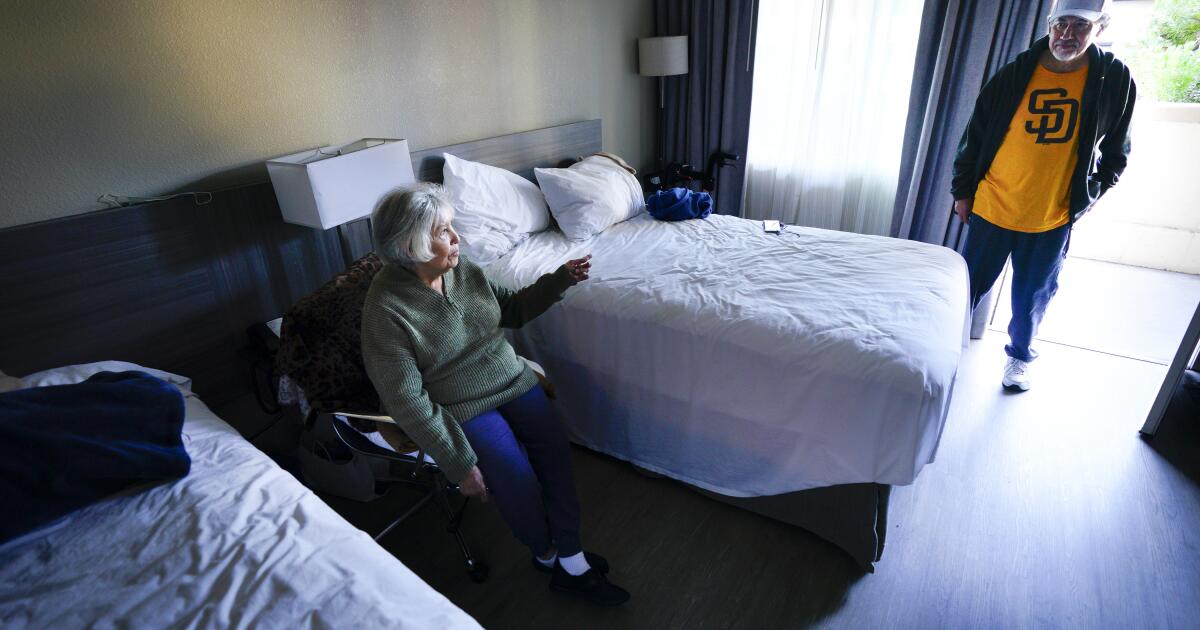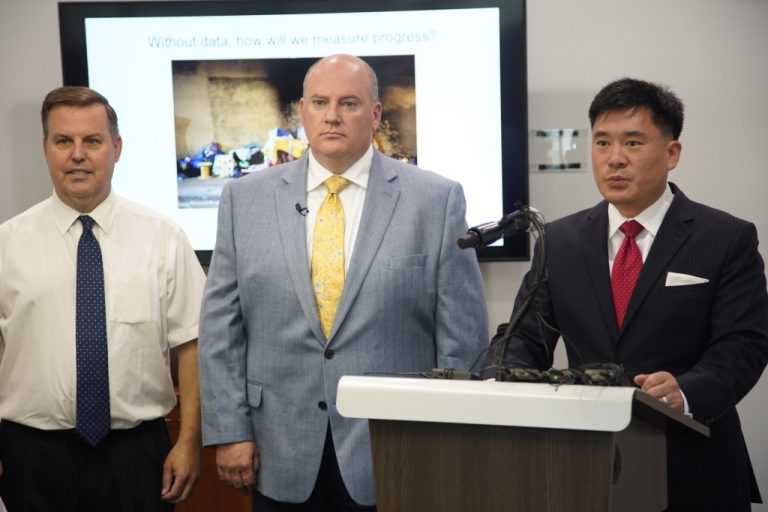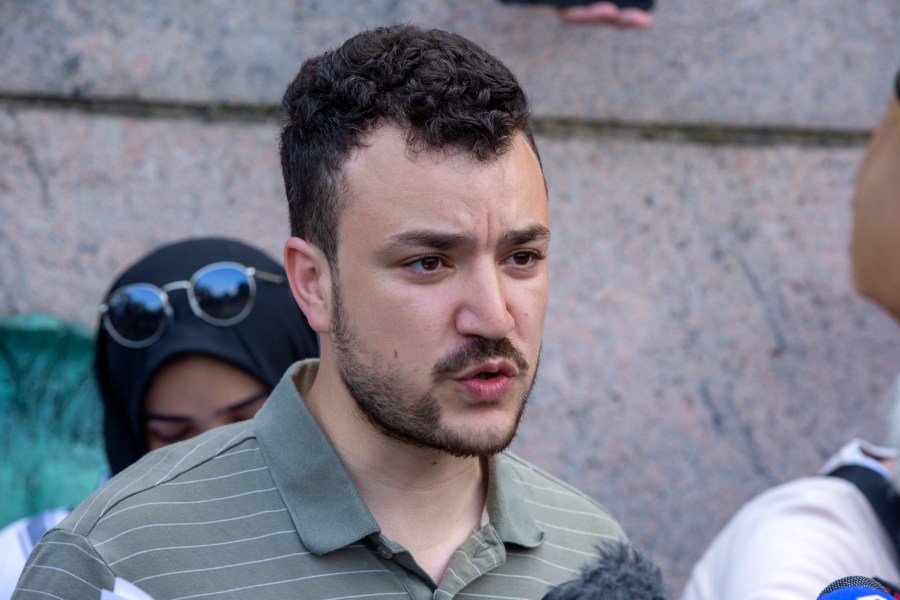
Every couple of weeks, Erminia Lopez walks from her room to the front desk at the Ramada hotel in National City, anxious to find out if she’ll be able to stay just a little bit longer.
After historic storms sent floodwaters surging into her nearby home two months ago, Lopez, 81, and her 59-year-old son Richard have been staying in a small room with two double beds, a microwave and just enough room for two walkers.
They’ve been there for over a month, and with uncertainty over what’s in store for their home, they intend to stay as long as they can.
The Lopez family is one of the 1,225 San Diego County households that were displaced when their homes flooded on Jan. 22 — the fourth-wettest day in San Diego since record-keeping began in 1850, and the wettest January day on record.
Two months later, many are still homeless as they work to repair and rebuild their homes — a process that for many could take at least a few more months.
Most of those households — 846 in total — are participating in a county program that provides flood victims short-term lodging at 65 local hotels, like the Ramada, across the county. People displaced by the storm can get up to 30 days of lodging, possibly more based on household circumstances.
While Lopez has had a mostly positive experience at the hotel, she said she faces weekly uncertainty over whether her stay will be extended again, due to what she says is lackluster communication from the county and its partners.
Residents say they typically aren’t told until just a day or two before their stay is up whether they’ve been cleared to stay longer or will have to find other accommodations.
“There’s confusion; there’s doubt,” she said. “It’s kind of up in the air most of the time, because we’re not sure what the next step is.”

Erminia Lopez, 81, has been staying in a single room at the Ramada in National City with her son, Richard Lopez, 59. Until repairs on their home are complete, she hopes that the county will extend her hotel voucher.
(Nelvin C. Cepeda/The San Diego Union-Tribune)
County officials have acknowledged flood victims’ concerns and say they are actively working to address them. Earlier this month, the Board of Supervisors unanimously approved nearly $10 million in funding to extend the program into May.
But it’s still unclear how long resources like this will be needed.
At the Extended Stay America hotel in Mission Valley, Daniel, a flood victim who declined to give his last name, considers himself one of the lucky ones.
He has to commute to North County for work and back down to Mountain View to pick up his 7- and 10-year-old boys from school each night before heading back to their temporary home — sometimes a three-hour round trip with traffic — but he’s grateful his family has a room with a small kitchen.
“They’re picky eaters,” he said, gesturing to one son as he gathered groceries in one arm, while balancing the other boy on his hip. “So it’d be a nightmare if we didn’t have a spot where we could cook our own meals.”
Daniel and his wife moved to San Diego just last year, away from their families on the East Coast, so they had no choice but to participate in the county’s hotel program. But he knows it’ll take much longer than 30 days to make his muddy home livable.
“We got real lucky and haven’t had to move hotels yet, but it has been stressful not knowing how long our luck will last,” he said.
His and the Lopez family’s stories illustrate a larger issue dividing flood victims from the resources they need to rebuild their homes and lives.
A total of 2,400 households — 7,750 people — were impacted by the floods on Jan. 22, which caused at least $30.8 million in public damage in San Diego County.
The county responded by setting aside $10 million to fund relief efforts for displaced residents, creating a temporary lodging program. This month, supervisors allocated nearly $10 million more to extend it.
Residents showed up in droves to that meeting to push for the funding and share their stories.
Among them was Aaron Swanton, who presented a petition signed by more than 900 people asking to extend hotel vouchers.
He and Roy Gonzalez, who said he lost everything in the floods, had co-founded Together San Diego to raise money for flood victims and organize volunteer recovery efforts.
“I’ve been in there, like, mucking houses — I know exactly how long this is going to take,” Swanton later told The San Diego Union-Tribune. “It’s going to take a long time.”

On Tuesday, Feb. 20, 2024, Brittany LeMoine, 39, and her son, Eduardo Cabrera, 18, begin to settle into their new hotel room.
(Nelvin C. Cepeda/The San Diego Union-Tribune)
But for weeks, flood victims have been raising concerns over the county’s lodging program and its contractor in charge of managing it, Equus Workforce Solutions, including poor communication and insufficient amenities.
“We’re not only worried about finding contractors and fixing our house, but we’re worried about, ‘Do we have to pack up our hotel?’” said Southcrest resident Brittany LeMoine, who is staying at the Ramada with her two children and mother. “It’s added more to the problems we have to deal with.”
Equus declined to respond to the Union-Tribune’s questions about residents’ concerns and its process for managing the program, but president and CEO Mark Douglass apologized to supervisors at the board’s last meeting.
“The weight of all the pain that I heard today, I sit with that and I own it,” he said. “My staff stands behind me. They’ve worked with what they have, and that wasn’t good enough, but we will make it right.”
Residents also brought their concerns directly to county officials, who say they are working to address them.
Spokesperson Michael Workman said the county has spoken directly with hotel management about room amenities, including reports of a lack of towels and toilet paper, and has added staff at hotels to provide more points of contact, including placing about 35 disaster service workers at 12 of the program’s most-used hotels.
He said the county has also begun providing case workers to help walk people through the decision of whether to use the county’s program or FEMA aid.
“It is important to note, there is not a model for long-term emergency non-congregate housing by local government,” he said in an email. “It is complex uncharted territory for us all.”
Supervisor Nora Vargas said the county has met with Equus about some of the concerns it’s heard from the community. “I know some of the folks have lost everything, and so we want to make sure people understand that we’re not taking this lightly,” she said.

Gerardo Hernandez waited in the lobby of the Ramada hotel in National City. The home Hernandez was renting flooded on Jan. 22. Now he’s relying on the county’s hotel voucher problem for temporary housing.
(Nelvin C. Cepeda/The San Diego Union-Tribune)
Gerardo Hernandez, a Southcrest resident who has been staying at the Ramada for a month and a half with his 23-year-old son, is glad the county has stepped in but called the program under Equus “a big mess.”
Hernandez said his home on Beta Street — an area in the Chollas Creek watershed hit especially hard by the storm — was destroyed, and his landlord terminated his lease the next day, leaving him to rush to remove his waterlogged belongings.
In the hurry, he had to throw most everything away, including his beloved sports cards collection.
At the Ramada, he’s had some trouble getting towels and toilet paper, but his bigger concern is communication from Equus. He says the contractor hasn’t been able to answer his questions about stay extensions, and he’s turned to hotel staff for confirmation.
Workman explained that the voucher program isn’t like booking a typical hotel room, as it takes time to update reservation details through all the partners involved, and cautioned that guests who ask hotel desk clerks could get the wrong information.
That may be scant consolation for San Diegans waiting for answers on where they’ll stay until their homes are habitable. But the work of local community organizations, they say, has helped.
“Without the nonprofits, who knows what would have been?” wondered Hernandez.
He wants to see things return to how they were under the YMCA, which ran a hotel voucher program for the first few weeks after the flood before the county launched its program. The first program ran much more smoothly, he said.
Such groups have stepped in to help flood victims, though they don’t typically focus on disaster response.
“It was really a big effort that the community really, really stepped up for,” said Barry Pollard, CEO of the Urban Collaborative Project, a community outreach program.
The Harvey Family Foundation has been bringing dinner to residents staying at hotels. Its leader, Armon Harvey, said it has been paying for the meals out of its own budget and is waiting for the county to start funding them.
“Of course, everybody was asking, ‘Where’s the city?’ and ‘Where’s the county?’ But it takes them time to respond,” Pollard said. “The county has been very, very responsive.”
Justin Lipford, the YMCA’s director of community engagement, thinks the county should be seeking more long-term solutions, beyond extending the voucher program.
“After May 11, there is no clear understanding — at least on my side — of what’s going to happen to folks that can’t return home,” he said.
Pollard agreed. He hopes this is a wake-up call that prompts the city and county both to create community-based disaster response plans.
“What we’ve experienced with this (shows) what not to do in the future — and that is probably one of the biggest advantages in retrospect, looking back,” he said.
For now, the temporary residents of the Ramada are holding on to the county’s voucher program for as long as possible.
For Marcela Ralac, the hotel is close to her flooded home, so she can more easily go check on reconstruction work.
Without the hotel voucher, LeMoine said she’d bring her family to camp out in their home in Southcrest, though the only thing left inside is a toilet.
The Lopez family also hopes to stay until their house is ready, which their landlord says will be in two months.
In the meantime, they’ll keep sharing a hotel room where despite their different taste in television — he likes “Blue Bloods,” she prefers QVC — they’re making it work.
“We need to be secure,” Richard said.






